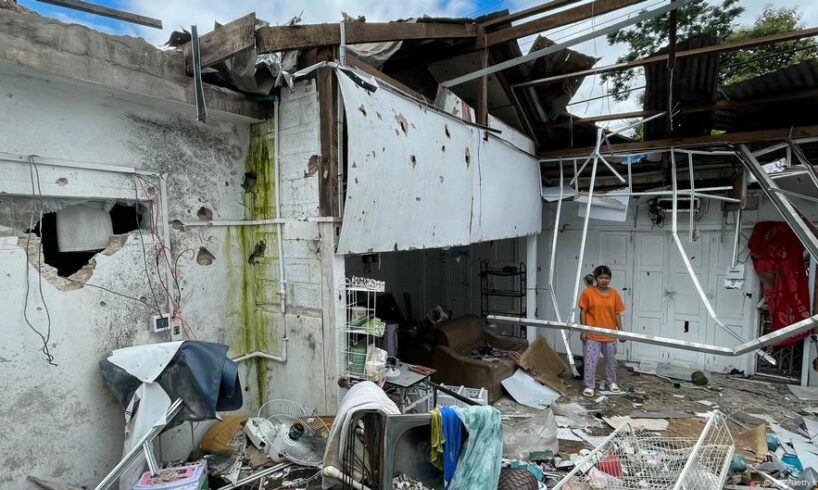
Bombs made with Chinese support are “widely used by the Myanmar Air Force in indiscriminate attacks on civilians,” according to a new report by the Special Advisory Council for Myanmar (SAC-M), an independent group founded by three UN officials and comprised of international experts.
The report Factory of Death: China’s Support for the Myanmar Military’s Production of Aerial Bombs focuses on the links between the state-owned China South Industries Corporation, also known as China South, and weapons factory DI 21 in Magway, central Myanmar. The researchers used publicly available information, testimonials, official documents, expert estimates and other sources of information to compile the document.
China South and its subsidiary Hunan Vanguard have been “essential to establishing the majority of the factory’s current production lines,” according to SAC-M findings.
How gamers are funding Myanmar’s resistance
To view this video please enable JavaScript, and consider upgrading to a web browser that supports HTML5 video
This includes sending Chinese engineers across the border, training DI 21 staff in China, as well as supplying key components for the bombs. According to the report, the Chinese company still provides remote technical assistance to the production site in Myanmar.
The junta’s defense industry is “entirely dependent on foreign material supplies — including micro-electronics — for many of the components used in bombs manufactured at DI 21,” the report says.
China South ‘complicit’ in attacks on civilians
Yanghee Lee, a former UN special rapporteur on the situation of human rights in Myanmar, and one of the founders of the SAC-M, said China must end military support to the Myanmar junta.
“China South is a state-owned company — it answers to the government of China. By providing aerial bombs and technical production assistance to the OCDI, China South is complicit in the junta’s grave violations against civilians. China must immediately end all support for Myanmar’s military arms manufacturing.”
Marzuki Darusman, former attorney general of Indonesia and another co-founder of the SAC-M, said memories of bombs will stay with Myanmar people long after the end of the civil war.
“When the Myanmar people look to China, they hope to see a force for genuine peace and stability. Instead they see the sponsor of their suffering. The bombs laying to waste to their communities are manufactured with China’s help in DI 21,” Darusman said in a press release. “Is this the legacy China wants in Myanmar?”
Junta bombing at ‘unprecedented rates’
The junta has lost control of vast swathes of Myanmar territory in the years following the military coup of 2021. As a result, the military leaders have been relying on air strikes to target what they argue are terrorist groups.
But many have questioned this narrative, especially after the infamous 2023 bombardment of Pa Zi Gyi village in the Sagaing region which killed 155 people, including many children, according to the UN. The bombings have continued since then, with 23 people killed in an air strike on a Buddhist monastery in Sagaing last week.
“Countrywide data confirms the use of fighter jets, helicopters and UAVs to bomb locations across Myanmar at unprecedented rates,” SAC-M said in the report published on Wednesday. “Local researchers estimate that, in the final four months of 2023 alone, the military carried out 750 airstrikes across 11 regions in Myanmar, with an average of six airstrikes nationwide every day.”
China using UN veto ‘to protect’ Myanmar junta
Khin Ohmar, a Burmese peace and security advocate, says the SAC-M report is more evidence that shows China is interfering in Myanmar’s affairs.
“China’s arms industry is enabling the junta’s thousands of aerial bombings that massacre civilians, including internally displaced people, elderly, children and women,” she told DW.
“At the UN Security Council, China uses its veto power to prevent global arms embargo and protect the war criminal junta, ensuring arms keep flowing. This is the meddling of China in our country’s affairs, that has severely violated international human rights and criminal law, and there needs to be accountability under law,” she added.
New technologies for Min Aung Hlaing regime
Beijing has supplied the Myanmar military with arms for decades, while also investing billions into the country’s crucial oil and gas sector. After years of civil war, China is also one of the junta’s few remaining international allies.
While the EU, the US, the UK and Canada have all imposed sanctions on the military regime, the Chinese support seems only to be growing stronger — especially since the devastating Myanmar earthquake in March. After traveling to China in November 2024, the junta boss Min Aung Hlaing met with Chinese President Xi Jinping in Moscow two months ago.
Myanmar’s rulers declare ceasefire to aid relief effort
To view this video please enable JavaScript, and consider upgrading to a web browser that supports HTML5 video
“Xi Jinping’s frequent meetings and interactions with Min Aung Hlaing since the Myanmar earthquake send a strong signal that China is supporting his regime at the highest level,” Jason Towers, the former Myanmar country director at the United States Institute of Peace, told DW.
“Decision-makers in (the border province of) Yunnan and powerful Chinese state-owned enterprises have also aligned more closely with the junta since the earthquake, and are angling to lock in new economic deals just as they are providing the regime with new technologies that are strengthening its position on the battlefield,” he added.
DW reached out to both the Chinese Embassy in Myanmar and the State Council of China for comment but has not received a reply before publication time.
Edited by: Darko Janjevic





